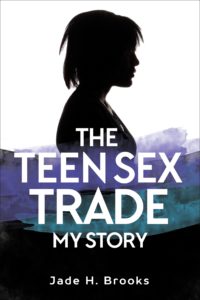The Teen Sex Trade: My Story (Formac 2017) is a no-holds-barred account of human trafficking in Canada. Author Jade Brooks, now 25, was born in Toronto and grew up in Halifax. At age 11, she was put into foster care and by age 17 found herself lured into the sex trade. While her memoir tells her own harrowing tale, Jade says far too many young women can relate to her experiences.
Understorey Magazine had the chance to speak with Jade about her story and the process of writing her first book.
UM: Were you hesitant to be so open and vulnerable when telling your story?
JB: Vulnerable is something I have always been and will always be to some extent. I wasn’t hesitant to be vulnerable and open in sharing my story. Although it was challenging (and embarrassing) at times, I knew that the truth was bigger than those feelings and that it had to get out there.
UM: How long did it take to write the manuscript?
JB: The first draft of the book took approximately six months. Once I signed my contract with the publisher, the editing process took another year or so until it was officially finished and ready for print. There was a period of about six months between finishing the first draft and signing on with the publisher.
 UM: What (or who) inspired you to write the book?
UM: What (or who) inspired you to write the book?
JB: A friend of mine was the initial inspiration for the book. In telling him a bit of what I’d been through, he suggested I write a book. He said that I may save someone’s life. Once I really dove into my writing, it was healing.
UM: You’re also a poet. Is writing a form of therapy for you?
JB: Poetry and writing are not only therapy for me, they are peace of mind. They are how I solve problems. Writing enables me to express myself freely, helping me to understand myself and the world around me.
UM: You recently gave birth to twins. How do you feel about them reading your book once they are older?
JB: I feel having them read the book is crucial to their development as young people, as humans. I feel that they need to know that this happens. What better way to discuss it with them than to have been through it myself.
UM: What is the one message you want readers to take from the book?
JB: One message, among many, is that abuse is not normal, no matter the ways in which it manifests itself.
UM: What is your message to other girls going through the same thing?
JB: I want young girls to know that what they are experiencing is not their fault. Guilt is a very heavy burden to carry and I know because I’ve carried it. I want to let them know that their love (for their pimp) is valid, but the things they have to sacrifice proves that his love is not reciprocated. Love isn’t supposed to hurt; it doesn’t require you to sell any part of yourself. Also, when they are ready to leave, they will find a way. The female spirit is resilient and can only be held down for so long before it rises.
UM: In the book, you mention the sex trade is a common part of people’s lives in the community where you lived. Why do you think this is and how do we break this cycle?
JB: I think it is in response to intentional systemic barriers that Black people have faced over many generations. I’ve learned from a therapist that I used to work with that when a human being is denied its power for so long, it will do just about anything to regain that power, even things that are harmful or unethical. The male and female roles in this crime/lifestyle are attempts to get out of poverty, to seek love where there once was none, to feel some sort of freedom and autonomy over oneself. There is more to be said about why this is normal, but that is some of what I’ve observed. We break the cycle by allowing ourselves to be vulnerable, as I have done in my book, and educating ourselves as well as our children and our peers. We must first admit that it’s a problem, be open about our experiences and make a conscious decision to live better, to treat our male and female counterparts with more respect. This has to be dealt with on a human level because a lot of perpetrators and victims don’t even look at themselves or others as worthy of basic respect. Once we come together with that type of foundation, then we can look at breaking down systemic barriers that keep us in poverty, both locally and globally.
UM: In the epilogue, you mention a second book. What will it be about?
JB: My second book will detail how I came to a place of peace within myself, the experiences I had along the way and the lessons I learned that allowed me to understand myself and trust my intuition. It will likely be less of a story and structured more as a guide book. That’s the vision I have right now. It could change.

